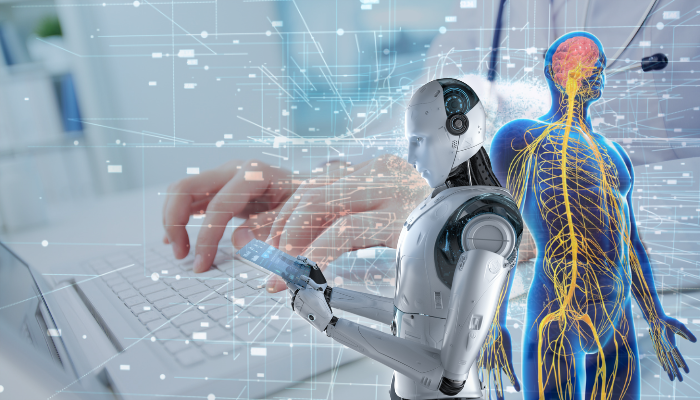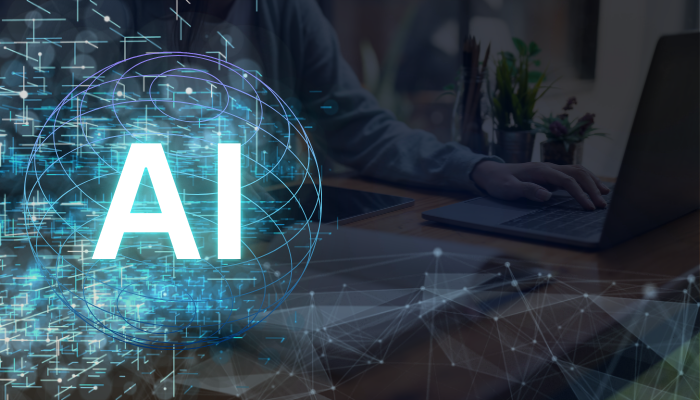Have you ever wished healthcare could move faster or be more straightforward? What if there was a way for doctors to make diagnoses quicker, or for treatments to be developed in less time?
That’s where generative AI steps in. It’s already helping healthcare professionals speed up diagnoses, create new treatments, and even predict potential health risks before they become serious. And it’s happening right now, making healthcare more efficient and personal.
In this blog, we’ll explore how generative AI is making a real impact in healthcare—whether it’s improving diagnostics, accelerating drug development, or making the whole system work better.
Let’s take a look at how AI is changing things for the better.
What is Generative AI?
Generative AI is a type of artificial intelligence that doesn’t just analyze data—it creates new content from it.
Unlike traditional AI, which recognizes patterns, generative AI generates new solutions or insights based on what it learns. It can create entirely new data, models, or ideas by understanding existing information.
In healthcare, generative AI can:
- Generate medical images for training or diagnostic purposes
- Suggest new drug compounds for faster treatment development
- Predict patient outcomes based on complex data patterns
- Simulate rare conditions to assist in diagnosis and research
What makes generative AI powerful is its ability to think beyond existing solutions. It doesn’t just help solve problems—it creates new possibilities.
This is why it’s making a big difference in healthcare. By generating new insights and solutions, it helps improve processes, reduce time, and ultimately lead to better patient care.
How Generative AI is Changing Healthcare
Now that we understand what generative AI is, let’s take a look at how it’s already helping in healthcare.
1. Speeding Up Diagnostics
Generative AI helps doctors diagnose conditions faster. By generating realistic medical images or analyzing patient data, AI can quickly identify patterns that might be missed by the human eye. This means doctors can make decisions more quickly, which is critical in situations like emergency care or cancer detection.
2. Improving Drug Discovery
Finding the right drug for a condition takes time and resources. With generative AI, researchers can generate potential drug compounds in a fraction of the time it would take manually. AI models analyze biological data to suggest molecules that could work as treatments, speeding up the drug development process.
AI needs a powerful digital foundation. Learn how to build it with our 2024 Healthcare Web Dev Guide.
3. Personalizing Treatment Plans
Generative AI is also being used to create personalized treatment plans for patients. By analyzing a person’s medical history, genetics, and lifestyle, AI can recommend the most effective treatments. This reduces the trial-and-error approach and improves the likelihood of success for each patient.
4. Enhancing Healthcare Operations
Beyond patient care, AI is also helping improve healthcare operations. Generative AI can automate administrative tasks, like filling out forms or managing patient records, reducing the time spent on paperwork. This lets healthcare providers focus more on patients and less on logistics.
5. Predicting Health Risks
AI models can predict a patient’s risk of developing conditions like heart disease or diabetes. By analyzing health data over time, AI can generate predictive models that alert doctors to potential issues before they become serious. Early detection means earlier interventions and better outcomes for patients.
As we can see, generative AI is already having a significant impact on the healthcare sector. Next, let’s take a closer look at specific generative ai use cases in healthcare where this technology is making a real difference, from improving diagnostics to streamlining operations.
Generative AI Use Cases in Healthcare System
Generative AI is already making significant strides in healthcare, offering practical solutions that improve efficiency, reduce costs, and enhance patient care. Here are some real-world use cases of generative AI in healthcare:
1. Enhancing Medical Imaging and Diagnostics
Medical imaging is one of the areas where generative AI has made a notable impact. AI systems can generate and enhance medical images, such as X-rays, MRIs, and CT scans, providing doctors with clearer, more accurate visuals to assist in diagnosis.
- Synthetic Image Generation: AI can generate synthetic images to augment training datasets. This is especially valuable in cases where rare diseases or conditions are involved, allowing doctors to train on data that might otherwise be unavailable.
- Improved Detection: AI systems, powered by deep learning models, can detect anomalies (e.g., tumors or fractures) with remarkable accuracy. These models analyze patterns in medical images that are often too subtle for the human eye.
Impact: This leads to faster diagnoses, more accurate results, and potentially better patient outcomes, especially in high-pressure environments like emergency rooms.
2. Accelerating Drug Discovery
The process of drug discovery is both time-consuming and costly. Generative AI can drastically reduce the time it takes to identify potential drug candidates and speed up the overall R&D process.
- Molecular Generation: AI can generate novel molecular structures with the potential to become new drugs. By training on vast databases of molecular data, AI can propose compounds that may not have been considered by human researchers.
- Predictive Modeling: AI models can predict how molecules will interact with biological systems, helping researchers focus on the most promising candidates. These predictions also help eliminate compounds that are likely to fail in clinical trials.
Impact: By shortening the time required to discover new treatments, generative AI reduces the overall cost of drug development, making new medicines more affordable and accessible.
3. Personalized Treatment Plans
Generative AI is enhancing personalized medicine, which tailors treatment plans to individual patients based on their unique characteristics, including genetic makeup, medical history, and lifestyle.
- Genetic Data Analysis: AI systems can analyze genomic data to predict how a patient will respond to a specific treatment. For example, it can suggest which chemotherapy drugs will be most effective based on a cancer patient’s genetic profile.
- Treatment Optimization: AI helps doctors create more personalized treatment regimens by considering multiple variables—like the patient’s age, medical history, and even preferences. The AI generates the optimal treatment plan and adjusts it as needed based on real-time feedback from the patient.
Impact: Personalized treatment increases the likelihood of successful outcomes and reduces side effects, as treatments are specifically tailored to the patient’s needs.
4. Virtual Health Assistants
Generative AI-powered virtual health assistants are increasingly used to help patients manage their healthcare needs.
- Symptom Checkers: These assistants can generate responses to patient questions based on symptom inputs, providing a preliminary diagnosis and recommending next steps. For example, if a patient enters a list of symptoms, the AI can offer potential diagnoses and direct them to the appropriate specialist or emergency care if necessary.
- Medication Reminders and Health Monitoring: Virtual assistants can remind patients to take their medication, monitor vital signs, and provide insights into their daily health metrics (such as weight or blood pressure) to adjust treatment plans.
Impact: Virtual assistants free up healthcare professionals from answering routine questions and help ensure patients follow their treatment plans, leading to improved adherence and overall outcomes.
5. Predicting Health Risks and Preventive Care
One of the most promising applications of generative AI in healthcare is predictive analytics. By analyzing historical and real-time data, AI can predict a patient’s risk for developing certain health conditions.
- Early Detection: AI models can identify patterns that suggest a patient is at risk for conditions like diabetes, heart disease, or even mental health issues. For example, an AI system might analyze a patient’s diet, exercise, and family history to predict the likelihood of diabetes and suggest preventive measures.
- Population Health Monitoring: On a larger scale, AI can help public health officials identify emerging trends in health risks across populations, allowing for targeted interventions.
Impact: Predicting health risks allows for earlier interventions, which can prevent chronic diseases and lead to a healthier population overall.
6. Enhancing Healthcare Operations and Administration
Generative AI is also used to improve healthcare administration, automating routine tasks that would otherwise take up valuable time.
- Automating Documentation: AI can generate and organize medical records, reducing the time spent on paperwork. This includes filling out patient histories, coding diagnoses, and managing insurance claims.
- Streamlining Appointment Scheduling: AI-driven scheduling tools can automatically book, reschedule, and cancel appointments based on availability, patient needs, and urgency, improving hospital or clinic efficiency.
Impact: Healthcare professionals spend less time on administrative tasks, allowing them to focus more on patient care, which leads to higher productivity and a better patient experience.
7. Enhancing Mental Health Care
Generative AI is also making waves in the field of mental health by creating tools that offer support for individuals facing conditions like anxiety, depression, and PTSD.
- Therapeutic Conversations: AI-driven platforms can offer emotional support by simulating conversations with therapists or counselors. These systems are designed to generate empathetic responses, helping users manage symptoms and providing coping strategies.
- Personalized Mental Health Plans: AI can analyze a patient’s responses over time to generate a personalized mental health treatment plan, offering specific advice and exercises based on the user’s emotional state and progress.
Impact: AI-powered mental health tools can be used as a first point of contact, providing immediate support, and helping to reduce the burden on mental health professionals.
8. Generating Synthetic Medical Data
Generative AI can create synthetic medical data that is used for training, research, and simulation purposes. This data can simulate a wide range of patient conditions without the privacy concerns associated with real patient data.
- Training Models: By generating synthetic data that mimics real patient data, AI allows researchers and medical professionals to train models and tools without needing access to sensitive information.
- Simulating Rare Conditions: Generating synthetic data is particularly useful in scenarios where rare diseases or conditions are hard to come by. AI can create realistic simulations of these conditions to train medical staff.
Impact: This allows for more comprehensive training, better research outcomes, and increased access to data without compromising patient privacy.
9. Clinical Documentation and Data Analysis
Generative AI plays a key role in automating clinical documentation and data analysis, reducing the administrative burden on healthcare providers.
- Automating Report Writing: AI can generate clinical reports from raw data entered by healthcare providers, automatically summarizing patient visits, diagnoses, and treatment plans.
- Data Analysis: AI systems can analyze large datasets of clinical data to identify trends, uncover insights, and generate reports that can guide clinical decisions and policy-making.
Impact: This reduces errors, saves time, and enhances the ability of healthcare providers to make informed decisions based on comprehensive, real-time data analysis.
Generative AI in healthcare is a huge opportunity, but it’s not without its challenges. By addressing these hurdles head-on with practical solutions, we can tap into its full potential and make healthcare more efficient, accessible, and patient-focused.
Challenges and Solutions of Implementing Generative AI in Healthcare
While Generative AI is paving the way for groundbreaking advancements in healthcare, the journey to full-scale adoption comes with its own set of challenges. Let’s look at these obstacles and how we can tackle them:
1. Data Privacy and Security Concerns
Challenge: Healthcare data is highly sensitive, and ensuring its privacy and security is critical. Implementing Generative AI requires access to vast amounts of patient data, which raises concerns about data breaches, unauthorized access, and compliance with regulations like HIPAA.
Solution: To address this, robust encryption protocols and secure data storage solutions must be implemented. Leveraging technologies like blockchain for secure and immutable record-keeping, along with strong authentication systems, can help safeguard patient information. Additionally, AI models should be trained using anonymized data to minimize privacy risks.
2. Bias in AI Algorithms
Challenge: Generative AI systems are only as good as the data they are trained on. If the data is not representative of diverse patient populations, the AI may inherit biases, leading to inaccurate predictions or treatments for certain groups, particularly minorities.
Solution: To tackle bias, healthcare providers need to ensure that the data used to train AI models is diverse and representative of all demographic groups. Regular audits of AI models for fairness, coupled with a transparent process for data collection, can help identify and correct biases before they cause harm.
3. Integration with Existing Healthcare Systems
Challenge: Integrating Generative AI tools into existing healthcare systems, such as Electronic Health Records (EHRs) and Hospital Management Systems (HMS), can be complex and time-consuming. Healthcare systems are often outdated and not built to work seamlessly with AI technologies.
Solution: The key to overcoming this challenge is a modular integration approach. By adopting API-driven architectures and cloud-based systems, healthcare providers can gradually integrate AI solutions without disrupting their existing workflows. Collaborating with AI-first technology partners who understand the nuances of healthcare systems can also smooth the process.
4. Regulatory and Compliance Hurdles
Challenge: Healthcare is one of the most regulated industries, and Generative AI must comply with strict guidelines like FDA approvals for medical devices, data privacy laws, and other local regulations. Navigating these regulations can slow down AI adoption.
Solution: Healthcare organizations can work closely with regulatory bodies from the outset to ensure that AI tools meet all necessary standards. Building AI models that are explainable and auditable will help with compliance, as regulators need transparency in how decisions are made.
Additionally, engaging with AI ethics experts can help ensure compliance without compromising innovation.
5. Trust and Adoption by Healthcare Professionals
Challenge: Many healthcare professionals may be reluctant to trust AI-driven recommendations due to a lack of understanding or previous negative experiences with automation in the healthcare sector.
Solution: To foster trust, it’s essential to build collaborative AI tools that work alongside healthcare professionals, providing assistance rather than replacing them. Offering comprehensive training and real-world case studies that show AI’s effectiveness in improving patient outcomes can help build confidence.
Starting with small-scale trials and gradually expanding AI usage also allows for smoother adoption.
6. High Implementation Costs
Challenge: Generative AI implementation can be expensive, especially for smaller healthcare organizations or those with limited resources. The cost of training models, maintaining infrastructure, and ensuring scalability can be a significant barrier to entry.
Solution: Cloud-based AI solutions can help reduce upfront costs by offering scalable, pay-as-you-go pricing models. Additionally, healthcare providers can prioritize cost-effective AI applications that address the most critical needs first, such as streamlining administrative tasks or improving diagnostic accuracy.
Partnerships with AI technology providers offering flexible payment options can also make implementation more affordable.
How Codewave Supports Generative AI in Healthcare
Generative AI’s potential in healthcare demands robust technical execution—Codewave delivers precisely that. As a specialized healthcare AI development partner, they empower providers with:
✔ AI-Driven Clinical Workflows – Automating medical documentation, diagnostics, and imaging analysis with NLP and computer vision.
✔ Compliant AI Deployment – HIPAA/GDPR-ready solutions for secure patient data handling.
✔ Virtual Health Assistants – Intelligent chatbots for triage, scheduling, and personalized care.
✔ Predictive & Precision Medicine – Leveraging LLMs (like GPT-4, Med-PaLM) for drug discovery and treatment planning.
AI won’t implement itself. Let’s make it happen
Codewave is a UX first design thinking & digital transformation services company, designing & engineering innovative mobile apps, cloud, & edge solutions.







